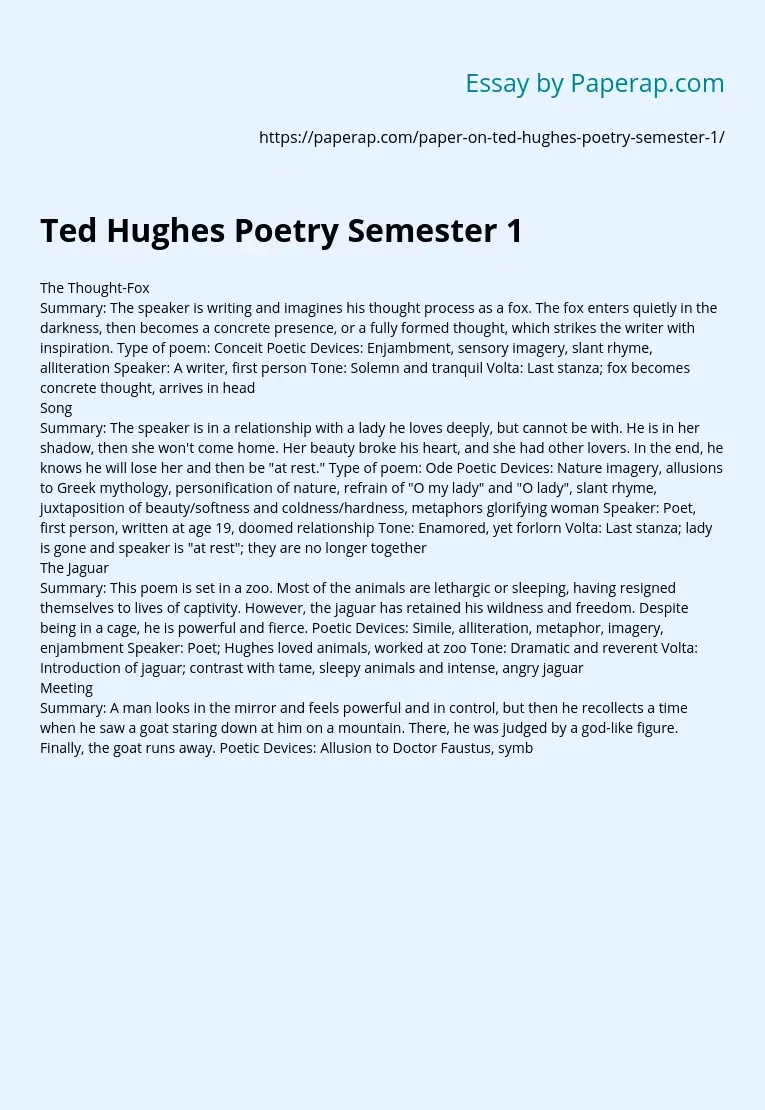Ted Hughes Poetry Semester 1
Type of poem: Conceit
Poetic Devices: Enjambment, sensory imagery, slant rhyme, alliteration
Speaker: A writer, first person
Tone: Solemn and tranquil
Volta: Last stanza; fox becomes concrete thought, arrives in head
He is in her shadow, then she won’t come home. Her beauty broke his heart, and she had other lovers. In the end, he knows he will lose her and then be “at rest.”
Type of poem: Ode
Poetic Devices: Nature imagery, allusions to Greek mythology, personification of nature, refrain of “O my lady” and “O lady”, slant rhyme, juxtaposition of beauty/softness and coldness/hardness, metaphors glorifying woman
Speaker: Poet, first person, written at age 19, doomed relationship
Tone: Enamored, yet forlorn
Volta: Last stanza; lady is gone and speaker is “at rest”; they are no longer together
Most of the animals are lethargic or sleeping, having resigned themselves to lives of captivity. However, the jaguar has retained his wildness and freedom. Despite being in a cage, he is powerful and fierce.
Poetic Devices: Simile, alliteration, metaphor, imagery, enjambment
Speaker: Poet; Hughes loved animals, worked at zoo
Tone: Dramatic and reverent
Volta: Introduction of jaguar; contrast with tame, sleepy animals and intense, angry jaguar
There, he was judged by a god-like figure. Finally, the goat runs away.
Poetic Devices: Allusion to Doctor Faustus, symbolism, simile, color imagery, onomatopoeia
Speaker: The poet, third person
Tone: Arrogant, then uncertain and timid
Volta: Switches from confident man to a recollection of a humbling moment of insecurity
Poetic Devices: Personification, simile, sensory imagery, metaphor, color imagery
Speaker: Man who lives in the house, first person
Tone: Alarmed, yet resolute
Volta: Second stanza, transition from the darkness of night to the day when wind’s destruction is visible.
Poetic Devices: Personification, metaphor, end rhyme, enjambment, repetition
Speaker: Third person/ the wineglass
Tone: Ominous and apprehensive, sense of dread
Volta: Winter’s effects become concrete at “then tons of chain…” because they disrupt entire rivers, not just small things
Poetic Devices: Simile, enjambment, sensory imagery, industrial imagery, alliteration
Speaker: A soldier, third person omniscient
Tone: Frantic, overwhelmed, panicked, frightened
Volta: At beginning and end of middle stanza; poem switches from action to soldier’s thoughts and then back to the action
Poetic Devices: Parallel structure, juxtaposition of happy photo and ugly war/death, nature imagery, consonance, war/death imagery
Speaker: Third person, except for “I” used once. Hughes’ father fought in a war and was emotionally damaged.
Tone: Nostalgic, but detached. There is a fondness for the men and tranquil setting, but the men’s deaths are described casually using blunt, graphic language.
Volta: Shift from six dead young men to the seventh traumatized man who survived.
Poetic Devices: Metaphor, alliteration, end rhyme, juxtaposition, slant rhyme
Speaker: The poet, Hughes grew up amongst farms and moorland in England.
Tone: In awe of the mighty power of wind and rain, derogatory towards man and animals, who deny nature’s power
Volta: First stanza describes storm’s effect on humans, shirts to creatures/landscape, third stanza concludes effect on animals and lesson of storm
Poetic Devices: Simile, color imagery, personification, hyperbole, industrial imagery, moon motif
Speaker: Poet; cat seems feral, but title is Esther’s Tomcat = he is a pet
Tone: Admiring and reverent towards cat, struck by the duality of their nature in day and night. Cat’s killing is god-like, humans are weak
Volta: After second stanza, cat awakens from sleep to deadly action
Poetic Devices: Consonance, Personification, Synecdoche, Enjambment, Repetition
Speaker: The hawk
Tone: Domineering and arrogant
Volta: Shifts from hawk’s thoughts to description of his actions and killing
Poetic Devices: Simile, enjambment, metaphor, consonance, alliteration
Speaker: Poet, young and naive boy, but jaded and numb adult with no remorse for pig
Tone: Detached and cynical, uses “they” to describe pig’s killers, no pity, objectifies pig
Volta: When speaker shifts to live piglet at the fair
Poetic Devices: Simile, personification, industrial imagery, alliteration, color imagery
Speaker: The poet
Tone: Dismal, yet hopeful
Volta: When speaker runs to woods, he goes from calm and pensive to panicked and scared
Poetic Devices: Alliteration, industrial imagery, biblical allusion, rhetorical question, enjambment
Speaker: The poet
Tone: Admiring and in awe of thrush, but critical of man
Volta: Speaker switches from praising thrush to degrading man in last stanza
Poetic devices: Hyperbole, industrial imagery, simile, personification, slant rhyme
Speaker: The poet
Tone: Somber because of winter and death, but hopeful for spring coming
Volta: None
Poetic Devices: Color imagery, personification, repetition, enjambment, simile, alliteration, consonance
Speaker: The poet
Tone: Reverent and pensive
Volta: Shifts from quaint fish praise to the violence of the pike cannibalism, then to reverence and dread of the huge, old fish in the pond.
Poetic Devices: Personification, Parallelism, Consonance, Metaphor, Simile, Alliteration, Color Imagery
Speaker: The poet, third person
Tone: Intense yet respectful, elevating the thistle to a position as a fierce fighter and equal of man
Volta: None
Ted Hughes Poetry Semester 1. (2018, Jan 10). Retrieved from https://paperap.com/paper-on-ted-hughes-poetry-semester-1/

